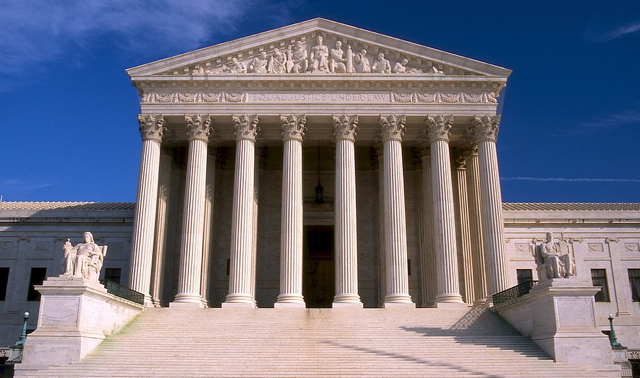The Supreme Court ruled in a 5-4 vote that states have the authority to collect sales taxes from online retailers, even if they don’t have a physical presence in the state. In doing so, the justices closed a loophole that helped Internet sales to grow and also overturned 50 years of its own precedents that banned states from collecting sales tax from companies without such physical presence. The decision did not follow typical ideological decisions, with liberal justice Ruth Bader Ginsburg joining conservative justices.
The Wall Street Journal reports that, “Justice Anthony Kennedy, who suggested years ago that the pre-Amazon.com precedent should be updated for the digital age, wrote for a majority” that also included Justices Clarence Thomas, Samuel Alito and Neil Gorsuch. Kennedy, who called the physical presence stipulation an “artificial, anachronistic rule,” referred to studies saying it deprives states of up to $33.9 billion annually in uncollected sales taxes.
The duty to pay those taxes has fallen on consumers, but a California tax board estimated that 96 percent of such taxes are not collected.
The physical presence rule was first established with a 1967 case and reaffirmed in a 1992 decision; “more than 40 states, territories and the District of Columbia that rely on sales taxes had urged overruling” of the rule while “groups representing conventional store retailers including Walmart and Target backed them.” Others against the tax were eBay and Etsy.
Notably silent was Amazon, which hasn’t collected taxes from most independent merchants on its platform. FactSet analysts estimate that “about $200 billion in sales originated with independent merchants selling on Amazon world-wide last year.”
The case the Supreme Court just ruled on was brought by South Dakota, which wanted to require Wayfair, Overstock and Newegg to “collect sales tax on transactions with the state’s residents.” Wayfair’s advertising that one of the benefits of buying from its site was no sales tax particularly irritated Kennedy, who called it “a subtle offer to assist in tax evasion.”
Justices “rarely disturb their own precedents,” but, said Kennedy, it “limited states’ ability to seek long-term prosperity and has prevented market participants from competing on an even playing field.” Even those voting against changing the rule, led by Chief Justice John Roberts, thought the physical presence stipulation was wrong but, noting the economic growth, wanted to “leave well enough alone.”
Congress, “under its constitutional power to regulate interstate commerce,” could have changed the rule, but chose not to do so.
Related:
Why Big-Ticket Items May Soon Cost You More Online, The Wall Street Journal, 6/24/18


No Comments Yet
You can be the first to comment!
Sorry, comments for this entry are closed at this time.